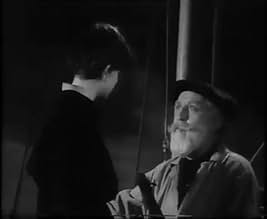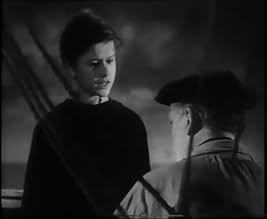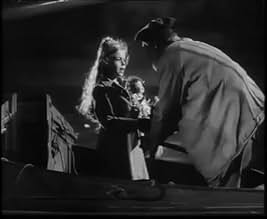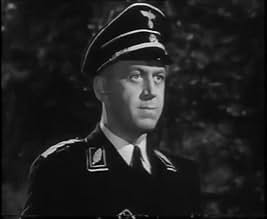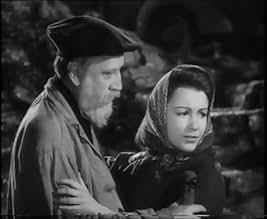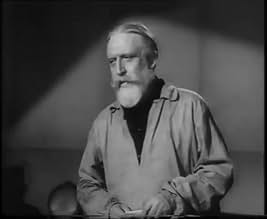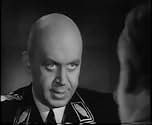अपनी भाषा में प्लॉट जोड़ेंWhile traveling in France during the Nazi invasion of 1940, an Englishman is entrusted with the care of a group of refugee children.While traveling in France during the Nazi invasion of 1940, an Englishman is entrusted with the care of a group of refugee children.While traveling in France during the Nazi invasion of 1940, an Englishman is entrusted with the care of a group of refugee children.
- 3 ऑस्कर के लिए नामांकित
- 4 जीत और कुल 3 नामांकन
Rudolph Anders
- Lieutenant
- (as Robert O.Davis)
फ़ीचर्ड समीक्षाएं
Monty Woolley is in France, fly fishing, when the radio announces the English evacuation of Dunkirk. Woolley had come to forget; his son, a flier in the RAF, is dead, and his attempts to serve in some capacity have been turned down. So here he is, occupying himself. But the other guest, an Englishwoman, at the inn he is staying at has to go elsewhere. She entrusts Woolley with her two children to get them back to England safely. They start off, but Germans slow them down. Somehow, they pick up other children to get to safety, and Ann Baxter, and even Dalio. But when they make it to the Channel, they are captured by Otto Preminger playing one of his Nasty Nazis, who is convinced that Woolley is an English spy using the children as a cover.
Is this a serious movie, or a fable? Or is there necessarily a difference between the two? Wooley gives a performance that goes from guarded and grumpy to open as he comes to realize his service is to take care of the children he has, largely unwittingly, been charged with. When Preminger prods him on what he means to do with this gaggle of children, he expounds on his decision to send them to connections in America. But had he thought this out earlier, or has it just occurred to him? Is this a well conceived idea, or just more English muddling through? I like to believe the latter, but would it make any difference to this tale of decency under threat?
With Roddy McDowall, J. Carrol Naish, Jill Esmond, and Peggy Ann Garner.
Is this a serious movie, or a fable? Or is there necessarily a difference between the two? Wooley gives a performance that goes from guarded and grumpy to open as he comes to realize his service is to take care of the children he has, largely unwittingly, been charged with. When Preminger prods him on what he means to do with this gaggle of children, he expounds on his decision to send them to connections in America. But had he thought this out earlier, or has it just occurred to him? Is this a well conceived idea, or just more English muddling through? I like to believe the latter, but would it make any difference to this tale of decency under threat?
With Roddy McDowall, J. Carrol Naish, Jill Esmond, and Peggy Ann Garner.
More than a few movie stars have learned their craft through the Yale School of Acting, including Meryl Streep, Paul Newman, and Sigourney Weaver. But not many professors teaching at the Ivy League university have become successful Hollywood actors. Monty Woolley was one of the most noteworthy dramatic instructors at Yale to make a go in movies. He earned the first of two Academy Awards Best Actor nominations for his role in August 1942's "The Pied Piper," as a Brit on a fishing vacation who finds himself leading a group of youngsters to freedom. The movie so impressed the Academy members they nominated it for Best Picture.
Nicknamed "The Beard," Woolley, a Manhattan native, taught English and Drama at Yale before directing Broadway plays beginning in 1929, followed by small roles in Hollywood starting in 1936. In his first film lead, 1942 "The Man Who Came to Dinner," Woolley re-enacted his stage role of the same name. "The Pied Piper" came next, causing him to admire his own acting talents, but was even more proud of his trademark beard. "Take the beards away from Santa Claus and Bluebeard and what do you have?" asked Woolley. "Nothing but a pair of middle-aged, overstuffed bores." In "The Pied Piper," Woolley, 64, plays Howard, an Englishman visiting France near the border of Switzerland when the Germans invade. Anxious to return home, he reluctantly takes his hosts' two children, Ronnie (Roddy McDowall) and Sheila (Peggy Ann Garner) to their relatives in England. On his way via train, Howard and company run into a number of obstacles while collecting other children along the way. One child includes the Jewish niece of Nazi officer Major Diessen (Otto Preminger), who wants Howard, who's his prisoner, to take her out of France. The Nunnally Johnson-written script adapted from Nevil Shute's 1942 novel of the same name emphasizes British patriotism as well as a critique on Nazi cruelty. The negative criticism of the Nazis in the movie would never have been permitted by the Hays Office censors before Pearl Harbor, but six months after the Japanese attack the honest portrayal of the German government was allowed.
Woolley had many fans, with an equal amount of critics who didn't particularly appreciate his brand of acting. Critic Erik Beck harped on his on-screen demeanor, claiming, "His acting seems to consist of standing around, blustering, and generally acting irritated. Wooley isn't a bad actor, but he's just bluster." Film reviewer Lura Grieve countered, "I have a soft spot for Monty Woolley, who was so good in films." His role as the guardian for the kids won him the Best Actor award from the National Board of Review.
"The Pied Piper" was the first film to star Otto Preminger, 37. The Austria-Hungary born director moved to the United States with his family at the outbreak of World War One. His first passion was the stage, both acting and directing. Handling four pictures in the 1930s, he increased his directing in the mid-1940s by producing a number of classics, including 1944 "Laura" and 1959 "Anatomy of a Murder." His performance as Major Diessen in "The Pied Piper" opened the eyes of the studios, pigeonholing him in a number roles playing German WW2 officers, including Colonel von Scherback in 1953's "Stalag 17." Besides the Academy Awards nominations for Best Picture and Woolley's Best Actor, "The Pied Piper" earned Edward Cronjager his third of seven Best Cinematographer (Black-and-White) nominations.
Nicknamed "The Beard," Woolley, a Manhattan native, taught English and Drama at Yale before directing Broadway plays beginning in 1929, followed by small roles in Hollywood starting in 1936. In his first film lead, 1942 "The Man Who Came to Dinner," Woolley re-enacted his stage role of the same name. "The Pied Piper" came next, causing him to admire his own acting talents, but was even more proud of his trademark beard. "Take the beards away from Santa Claus and Bluebeard and what do you have?" asked Woolley. "Nothing but a pair of middle-aged, overstuffed bores." In "The Pied Piper," Woolley, 64, plays Howard, an Englishman visiting France near the border of Switzerland when the Germans invade. Anxious to return home, he reluctantly takes his hosts' two children, Ronnie (Roddy McDowall) and Sheila (Peggy Ann Garner) to their relatives in England. On his way via train, Howard and company run into a number of obstacles while collecting other children along the way. One child includes the Jewish niece of Nazi officer Major Diessen (Otto Preminger), who wants Howard, who's his prisoner, to take her out of France. The Nunnally Johnson-written script adapted from Nevil Shute's 1942 novel of the same name emphasizes British patriotism as well as a critique on Nazi cruelty. The negative criticism of the Nazis in the movie would never have been permitted by the Hays Office censors before Pearl Harbor, but six months after the Japanese attack the honest portrayal of the German government was allowed.
Woolley had many fans, with an equal amount of critics who didn't particularly appreciate his brand of acting. Critic Erik Beck harped on his on-screen demeanor, claiming, "His acting seems to consist of standing around, blustering, and generally acting irritated. Wooley isn't a bad actor, but he's just bluster." Film reviewer Lura Grieve countered, "I have a soft spot for Monty Woolley, who was so good in films." His role as the guardian for the kids won him the Best Actor award from the National Board of Review.
"The Pied Piper" was the first film to star Otto Preminger, 37. The Austria-Hungary born director moved to the United States with his family at the outbreak of World War One. His first passion was the stage, both acting and directing. Handling four pictures in the 1930s, he increased his directing in the mid-1940s by producing a number of classics, including 1944 "Laura" and 1959 "Anatomy of a Murder." His performance as Major Diessen in "The Pied Piper" opened the eyes of the studios, pigeonholing him in a number roles playing German WW2 officers, including Colonel von Scherback in 1953's "Stalag 17." Besides the Academy Awards nominations for Best Picture and Woolley's Best Actor, "The Pied Piper" earned Edward Cronjager his third of seven Best Cinematographer (Black-and-White) nominations.
Curmudgeonly Briton "Howard" (Monty Woolley) is doing his best impersonation of "Rudolf Rassendyl", fishing peaceably and minding his own business, when the Nazis decide to invade France. He has to get home and is persuaded to take the two "Cavanaugh" children to safety with him. There's "Ronnie" (Roddy McDowall) and his sister "Sheila" (Peggy Ann Garner) who manage to irritate their new guardian just by being there, but they are just the start of his problems as they act like a magnet for other endangered children. Before he knows it, it's like he has his own herd of cats to try and smuggle out from under the nose of the menacing "Maj. Diessen" (Otto Preminger). Terrified of being heard to speak English, he and his charges gradually learn a little about themselves and this erstwhile selfish gent starts to demonstrate an whole new set of human traits hitherto a mystery to himself. Can he manage to get them, and himself, to safety though? It's a showcase for an on-form Woolley that features a few brief appearances from Anne Baxter and J. Carrol Naish as the adventure builds slowly but quite menacingly to a denouement that has something of last year's "Pimpernel Smith" to it. McDowall's is an engaging young character and the story exudes quite a healthy degree of sentiment-free mischievous charm as Woolley delivers the goods once again.
I read the novel twice many years ago and found it perhaps Nevil Shute's best story, and he wrote many, all outstanding. Still I am tempted to hint at the possibility that the film excels the book, much because of Monty Woolley's rendering of the grumpy old Englishman sick of everything who finds himself stranded in France by the war after Dunkirk and has to accept helping two children to England although he hates children. His long difficult odyssey through war-harried France to somehow reach England with constantly more orphaned children on his hands turns him into another and slightly different man, and the realism depicting this is what makes the film so impressing still today after 70 years for its more than just convincing character. It was made before any of the turning points of the war in 1942 after Pearl Harbour and the fall of Singapore while the Germans were still pounding Moscow and besieging Leningrad, in brief, when the war was at its grimmest. Nevil Shute's story is about humanity in the depth of the despair of this world crisis, which the film admirably conveys, underlining the realism. Monty Woolley, however, is finally matched by Otto Preminger as the German officer, who represents the final conversion to humanity and couldn't make it better as a perfectly brutal and revolting officer who finally has to fall to his own humanity. It's one of the greatest stories told from the second world war, and the film honours it. Strange though that this very important and wonderful film should be so hard to find on internet. A remake was made for TV in 1989 with Peter O'Toole which also pays credit to the story, such a story can only be told well, but that film can't be found at all.
Finally tracked down a tape of this 1942 filming of the Nevil Shute novel, and found it quite enjoyable. Monty Woolley is perfect in the lead, a crusty Brit on vacation in Switzerland who is persuaded, with WW2 imminent, to take a friend's two small children to safety in England. Other children join the group along the way, with the German army always around the next corner, leading to an exciting finale when the group is captured by a Nazi commander, played by Otto Preminger. Among the children are Roddy MacDowall and Peggy Ann Garner, and Ann Baxter plays a French girl who helps Monty and his charges elude the Germans. (Baxter's French accent is very convincing.) Two gripes: (1) the film is shot mostly in darkness and in close quarters, and one yearns for the director to open it up. (2) The aforementioned Preminger is over the top in his portrayal - which was of course standard in 1942. But the movie is worth seeing, and worth releasing on DVD. Now to find another "lost" Nevil Shute movie: Landfall. Any suggestions?
क्या आपको पता है
- ट्रिवियाThe original fairy tale was based on the disappearance of the children of the Dutch - not German - village of Hamelin. Although at the time they were thought to have vanished magically, it is now believed that the children left to join one of the Children's Crusades and were taken into slavery.
- गूफ़The seven-year-old German girl near the very end of the movie (at c.1:18 and at c.1:21) speaks German with a distinct American accent.
- भाव
Howard: I have two small children!
Railroad official: At your age, monsieur, that is undoubtedly magnificent!
- कनेक्शनFeatured in Minute Movie Masterpieces (1989)
टॉप पसंद
रेटिंग देने के लिए साइन-इन करें और वैयक्तिकृत सुझावों के लिए वॉचलिस्ट करें
- How long is The Pied Piper?Alexa द्वारा संचालित
विवरण
- रिलीज़ की तारीख़
- कंट्री ऑफ़ ओरिजिन
- भाषाएं
- इस रूप में भी जाना जाता है
- Mannen med sälgpiporna
- फ़िल्माने की जगहें
- उत्पादन कंपनी
- IMDbPro पर और कंपनी क्रेडिट देखें
- चलने की अवधि1 घंटा 27 मिनट
- रंग
- पक्ष अनुपात
- 1.37 : 1
इस पेज में योगदान दें
किसी बदलाव का सुझाव दें या अनुपलब्ध कॉन्टेंट जोड़ें

